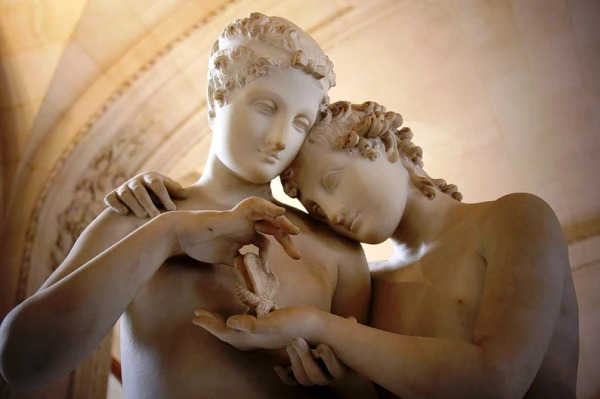Do we love with our hearts or our minds? Unexpected discoveries reveal where this emotion “lives” and answer the question of what changes in love in relation to different objects: a partner, children or pets.
Love is one of the most powerful and complex emotions we experience. Frequently mentioned about the heart as “the place where it lives”, is deeply ingrained in our culture, from romantic songs to everyday expressions. However, we know that the real “place” where love resides is none other than the brain. However, a recent study has revealed how our the brain processes emotional responses depending on each form of love.
The study, published in the journal Cerebral Cortex, involved 55 participants, all of whose parents were in healthy relationships. The researchers used functional magnetic resonance imaging (fMRI) to measure participants' brain activity as they thought about different forms of love.
In the study, participants were asked to imagine simple scenarios describing situations of “interaction” with their children, partners, friends, pets, nature. One of the most interesting results of the study it was that love for children evokes the strongest reactionsespecially in some specific areas of the brain (the reward center).
Such reactions (with the same intensity) were not observed with other forms of love. This indicates that Parental love may play a unique role in brain function.
Romantic lovealthough it did activate important areas of the brain, did not elicit the same profound response in the reward center. However, the researchers found that all forms of interpersonal love activate areas associated with social perceptionsuch as the basal ganglia in the temporoparietal region of the head.
Another interesting discovery was that love for pets affected the brain differently depending on whether the study participant had a pet or not. Those who had pets showed greater activation in areas associated with social perception compared to those who did not. This shows that Relationships with animals can improve the brain's social and emotional functions.
As for love for naturestudies have shown that it activates the reward system and visual areas of the brain, but does not activate the same areas associated with social perception as loving people.
The study's coordinator, philosopher and researcher Pärttyli Rinne, explained that understanding the differences in brain activity caused by different forms of love could have “practical implications.”These findings may help us better understand the nature of human relationships and develop more targeted psychological treatments for problems such as attachment disorders and depression.“,” the scientist noted.

Seven Types of Love in Ancient Greece
Eros. Enthusiastic passionate love, based primarily on devotion and affection for the beloved, and only then on sexual attraction. With such love, a person sometimes begins to almost worship the beloved. A desire to completely possess him/her appears. Idealization of the beloved occurs. But often there follows a period when “eyes open” / “rose-colored glasses fall off”, and, accordingly, disappointment in the beloved occurs. After disappointment, love passes, and the search for a new partner begins.
Ludus. Love is a sport, love is a game and a competition. This love is based on sexual attraction and is aimed exclusively at receiving pleasure. In such relationships, a person is more inclined to receive than to give something to his partner. Therefore, feelings are superficial, which means they cannot fully satisfy partners, they always lack something in the relationship, and then the search for other partners, other relationships begins. But in parallel, a relationship with a regular partner can be maintained. Short-lived, lasts until the first signs of boredom appear, the partner ceases to be an interesting object.
Storge. Love is tenderness, love is friendship. With this type of love, partners are also friends. Their love is based on warm friendly-partnership relations. This type of love often arises after many years of friendship or after many years of marriage.
Philia. Platonic love, so called because in his time it was this type of love that Plato extolled as true love. This love is based on spiritual attraction, with such love there is complete acceptance of the beloved, respect and understanding. This is love for parents, children, best friends, a muse. Plato believed that this is the only type of love that is true love. This is unconditional love. Selfless love. Love in its purest form. This is love for love's sake.
In addition, the ancient Greeks identified three more types of love, which are a combination of the main types:
Mania or as the ancient Greeks called this type of love: “madness from the gods.” This type of love is a combination of eros and ludus. Love-mania was and is considered a punishment. This is love-obsession. It makes the person in love suffer. And it also brings suffering to the object of the lover's passion. The lover strives to be near the beloved all the time, tries to control him, experiences crazy passion and jealousy. Also, the lover experiences mental pain, confusion, constant tension, uncertainty, anxiety. He is completely dependent on the object of adoration. The lover, after a certain period of such ardent love on the part of the lover, begins to avoid him and makes attempts to break off the relationship, disappear from his life, protect himself from the one obsessed with love. This type of love is destructive, brings destruction to both the lover and the lover. This type of love cannot exist for a long time, with the exception of sadomasochistic relationships.
Agape. This type of love is a combination of eros and storge. This is sacrificial, selfless love. The lover is ready to sacrifice himself in the name of love. In such love, there is complete dedication to the loved ones, complete acceptance and respect for the loved ones. This love combines mercy, tenderness, reliability, devotion, passion. In such love, partners develop together, become better, get rid of egoism, strive to give more than take something in a relationship. But it should be noted that this type of love can also be found among friends, but in this case, there will be no sexual attraction, everything else is preserved. This kind of love is also spoken of in Christianity – sacrificial love for one's neighbor. Preserved throughout life. But it is very rare.
Pragma. This type of love is a combination of ludus and storge. This is rational, rational love or love of “calculation”. This kind of love does not come from the heart, but from the mind, that is, it is born not from feelings, but from a conscious decision to love a specific person. And this decision is based on the arguments of reason. For example, “he loves me”, “he cares about me”, “he is reliable”, etc. This kind of love is selfish. But it can last a lifetime, and a couple with this kind of love can be quite happy. Also, pragma can eventually develop into another kind of love.







More Stories
Snacks – good or bad, what foods can be harmful
Farmer Throws Six Tons of Green Olives Out on the Street
Patras: First school suspension for using smartphone. Parents are outraged